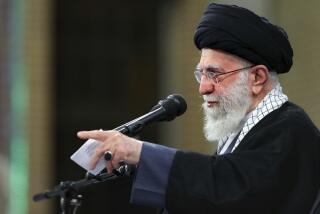Iran-Afghanistan Tensions Fuel Fear of Open Conflict
- Share via
WASHINGTON — With 70,000 Iranian troops poised along the Afghan border, senior U.S. officials warned Friday that rapidly escalating tensions between the two Islamic rivals could trigger open conflict in coming days.
One immediate flash point is the uncertain status of 10 Iranian diplomats and an Iranian journalist who disappeared from northwestern Afghanistan when the ruling Taliban consolidated its hold over the country last month. According to Amnesty International, the diplomats were “said to have been killed” when the Taliban entered the Iranian Consulate in Mazar-i-Sharif, an opposition stronghold.
In addition, U.S. officials said the Taliban, a radical Sunni Muslim group, may have engaged in a massacre of 5,000 Shiite Muslims around Mazar-i-Sharif during its takeover of the region. “It appears they were killed solely because they were Shiite, over a period of several days, after the Taliban took the city,” a senior U.S. official said.
The Iranian mission at the United Nations has been pressing for the deployment of a U.N. fact-finding team to Afghanistan to determine the fate of the local Shiite population, as well as its own diplomats.
“The Taliban has been engaged in the equivalent of ‘ethnic cleansing,’ ” said Amir Zamani, a spokesman at the Iranian mission. “We don’t know the exact figures, but a large group of people has been indiscriminately killed when Taliban forces went door-to-door and took people based on their ethnicity.
“Iran is engaged in extensive and serious negotiations in the region and at the U.N. to resolve this issue diplomatically,” he added. “However, Iran does not rule out any option.”
Iran, a predominantly Shiite Muslim country with long-standing influence in northwestern Afghanistan, has sheltered an Afghan militia chief and his followers since they were forced to retreat more than a year ago. If conflict does erupt, U.S. officials predicted, the militia would go in first, backed by Iranian troops.
The tensions heightened after Iran began three days of military maneuvers along the border this week. It was the largest deployment ever in that area and involved the best-equipped units of Iran’s military.
Tehran announced Thursday that its troops would remain along the border after the exercises ended. The Iranian Foreign Ministry also warned the Taliban that it faced a “harsh response” if the diplomats and journalist were not freed.
“If the Taliban chooses not to play it straight on the fate of the diplomats, they will face a severe response from us,” Foreign Ministry spokesman Mahmoud Mohammadi said. “These maneuvers are aimed at those who disregard international norms and seek to damage our national interests and security.”
In recent days, foreign intelligence organizations have monitored Iran’s deployment of supplies, ammunition, petroleum and other goods in an attempt to determine if a larger military effort might be envisioned, U.S. officials said.
Iran is unlikely to try to topple the Taliban, U.S. officials predicted. Its objective is more likely to weaken, intimidate and divert the extremist group.
But U.S. officials warned that Iran could be getting in over its head. “The Taliban forces on the other side are poorly equipped, and invading Afghanistan is easy, but it’s getting out of Afghanistan that is really hard,” said the senior U.S. official. “The Afghans are not storm troopers, but they have a lot of experience holding off outsiders.”
The rhetoric of conflict is clearly escalating. At Friday prayers, Ayatollah Mohammad Kashani, the powerful chief of Iran’s Council of Guardians, blasted the Taliban. “Iran has been treating those who come here like Muslim brothers, but in return you commit atrocities and take our diplomats hostage,” he said.
As many as 2 million Afghans lived in Iran during the Soviet occupation; about 1.4 million are still there.
The Taliban has warned Iran in return that it has taken “precautionary measures” to defend itself if Tehran Iran tries to invade.
More to Read
Sign up for Essential California
The most important California stories and recommendations in your inbox every morning.
You may occasionally receive promotional content from the Los Angeles Times.










